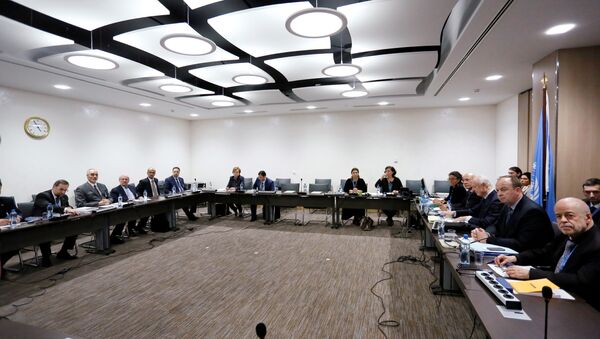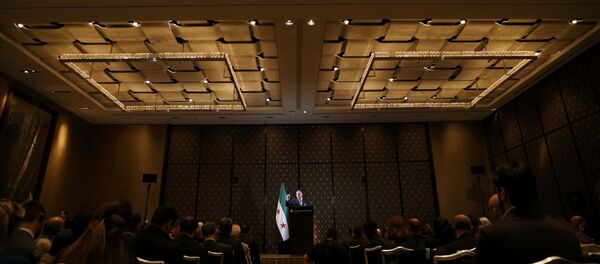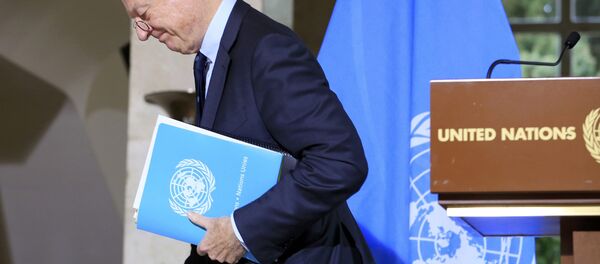GENEVA (Sputnik), Anastasia Levchenko — Most likely, almost two weeks that Syrian opposition platforms, the Damascus delegation and UN Special Envoy for Syria Staffan de Mistura spent together in discussions on what the format of the negotiations should look like, will be remembered as talks about talks.
"The main disadvantage of this round was that we spent a lot of time on logistics, and we did not talk, we did not negotiate, we did not sit at one table," Jihad Makdissi, the leader of the Cairo platform of Syrian opposition, told Sputnik, when asked to summarize the round.
"Nevertheless, the main success of this round is that it has managed to maintain the political momentum of the Geneva track, so nobody can say it's dead now. Keeping the momentum is the main outcome here," he added.
UNIFIED OPPOSITION: NOT THERE YET
Most of those who follow the intra-Syrian talks were laying their hopes on the opposition groups' ability to form a joint delegation at this round of talks.
Opposition members at intra-Syrian talks do not see eye to eye on the future of Syria and its current President Bashar Assad. The HNC is seemingly immovable in its "Assad must go" stance and insistence on political transition as a priority on the agenda of the talks. Other opposition groups have a more moderate vision and do not want to be absorbed by the Riyadh-backed umbrella organization.
Although merging did not happen, the groups, especially the HNC and the Cairo platform, started actual substantive coordination during this round of talks, and now recognize each other’s right to exist and common aims.
"The main disagreement between the Syrians today is on what the meaning of a political transition is. But we need to understand that the transition now is about the process of implementing Resolution 2254. It is no longer up to us to decide," Makdissi said.
AGENDA: NOTHING AGREED UNTIL EVERYTHING AGREED
Working out the agenda for the intra-Syrian talks has been another pressing issue and a hard task for de Mistura during the fourth round.
The government delegation insisted on including counterterrorism as the fourth basket. The HNC wanted to discuss issues in stages, starting with transition and governance.
Eventually, the preferences of de Mistura and Damascus won, and the UN special envoy announced at his closing press briefing that the agenda consists of four basket, which are to be discussed simultaneously.
This format was also enshrined in the formula "nothing is agreed until everything is agreed" in the procedural paper by de Mistura.
"Discussion in parallel is very good, because nobody can say: I am advancing terrorism, I do not want to talk about anything else. In parallel means that even if we finish terrorism, we cannot say we finish, we have to finish the other baskets," Makdissi told Sputnik.
Russia also played its role in pushing forward the idea of four baskets discussed concurrently. Russian Deputy Foreign Minister Gennady Gatilov held several meetings with the government delegation and opposition groups during his stay in Geneva.
DE MISTURA'S FUTURE: IN TALKS WITH WIFE
However, there was not a whiff of failure in the air at the closing remarks by de Mistura, who showed to journalists a photograph from the opening session of this round of talks, where the special envoy managed for the first time to bring together in one room all opposition groups, government delegation and representatives of the International Syria Support Group (ISSG).
"I would not underestimate the pressure that de Mistura is under, from all parties, even from the government. De Mistura is the mirror that reflects the complexity of international relations from all sides," Makdissi said.
Asked whether he is going to continue as the special envoy, de Mistura replied he is "in talks" with his wife about it.
"Honestly, I would not like to see somebody else as a mediator. Because having a new one would mean that we will have to wait for the new envoy to study the file. So we are talking about wasting at least 4-5 moths on it," Makdissi said.
"I feel that de Mistura is serious and in a hurry, he doesn't want to lose the momentum," he added.
De Mistura has not announced the date for the next round of the intra-Syrian talks yet, but said he is considering late March.
Geneva-5 will most likely be preceded by another round of Astana talks on Syria, where the focus will be on ceasefire implementation. According to Sputnik sources, the new negotiations in Astana will take place on March 14.




